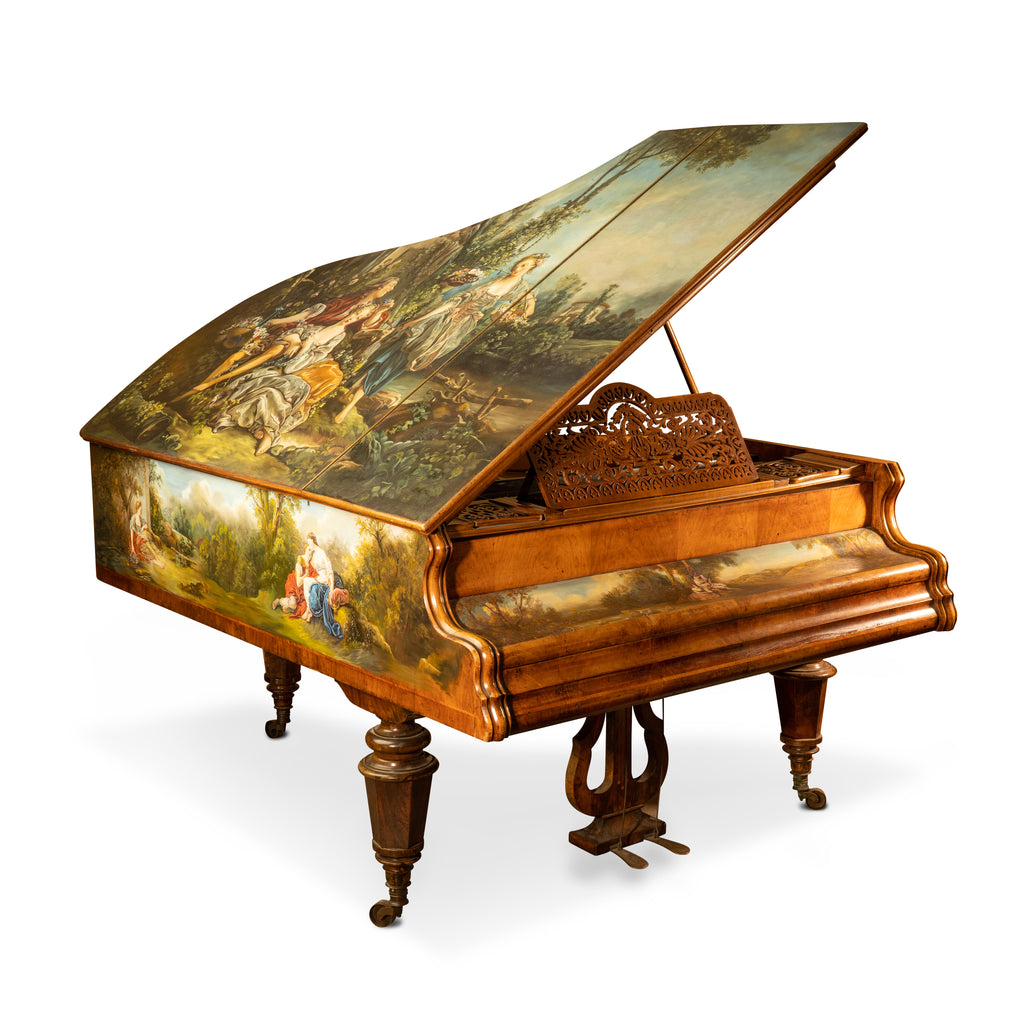A VERY FINE AUSTRIAN PROMBERGER & SON GRAND PIANO, 19TH CENTURY
$98,500.00
Indulge in the splendor of musical artistry with this Magnificent Antique Austrian Art-case Grand Piano by Promberger & Son. This opulent instrument, adorned with intricate details, presents a harmonious fusion of craftsmanship and visual elegance.
The piano's hinged serpentine lid and case sides are adorned with hand-painted scenes reminiscent of the 18th-century style, evoking the spirit of Francois Boucher's timeless artistry. The delicate brushstrokes capture the grace and charm of an era gone by, enhancing the piano's aesthetic appeal.
Adding to its allure, the piano features a pierced music stand and lyre-form pedal, embodying both functionality and artistic refinement. Resting gracefully on three tapering legs, the instrument exudes sophistication and stands on castors, allowing for both mobility and a commanding presence.
A glimpse beneath the lid reveals the stenciled signature of J. Promberger & Sohn, Wien, VII B. Neubau Hermaungrasse 25 I Stock. The opus number 2196 and the corresponding serial number 2196 authenticate the piano's provenance and contribute to its historical significance.
This Antique Austrian Art-case Grand Piano transcends its role as a musical instrument, emerging as a work of art in its own right. Its presence not only resonates with the melodies it produces but also serves as a testament to the artistry and craftsmanship of Promberger & Son. Whether showcased in a grand hall or cherished within a private space, this magnificent piano invites admiration for its aesthetic splendor and rich musical heritage.
The soundboard stencilled: J. PROMBERGER & SOHN, WIEN, VII B. Neubau Hermaungrasse 25 I Stock. Opus No. 2196
Serial number 2196.
Dimensions (with lid closed):
Length: 72" (182.8 cm)
Width: 58: (147.3 cm)
Height: 37" (93.9 cm)
Piano maker and inventor Johann Joseph Promberger Sen. (b. 1779 in Kuffulk, Tirol, d. 1834 in Vienna) started out studying carpentry and piano-making with Matthias Müller in Vienna. In 1811 he became a master craftsman, obtained citizenship of the city, and took over Michael Schweighofer's piano company by marrying his widow, Anna. From that moment on, the company became known as Schweighofer und Promberger. Promberger experimented with the aim of building a grand piano whose sound would resemble that of the cello. He also invented a portable keyboard chime-bells for military bands. In 1824 he obtained a patent for a new system of fitting strings and a metal sound board in a piano. In 1824 he built the Sirenion, a 125-centimetre-high upright piano with double stringing and a 'mobile' sound board, which was unveiled to the public in 1825 by his son Johann (b. 1810, pianist, student of F. Ries and C. Czerny; in 1837 he played a series of concerts in Warsaw on a grand piano built by F. Buchholtz). In 1828 Promberger and his son showcased the Sirenion as part of a tour of Prague, Dresden, Leipzig, and Berlin, receiving positive feedback. In 1829 he built its smaller version, measuring 114 cm, fitted with triple stringing. In 1832 he retired, leaving the workshop to his son Joseph. The Andrzej Szwalbe Collection in Ostromecko near Bydgoszcz owns one of the few surviving Sirenions, made c. 1825 (serial no. 14), fitted with the original action and thin aliquot strings accompanying FC bass strings


















